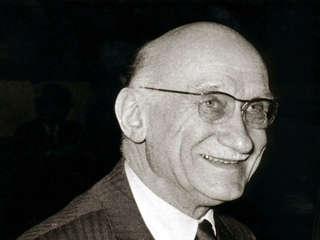
God and Caesar – Part I
From Jeff Fountain’s book Deeply Rooted.
Unknown to Schuman, others in seclusion, exile or internment also were grasping the opportunity to study, think, dream and prepare for the post-war years.
Already in 1933, Konrad Adenauer, when deposed as Lord Mayor of Cologne by Hitler after refusing to hoist the Nazi flag, had taken refuge for a year in the Maria Laach Abbey, familiar also to Schuman. He spent much of his time in hiding re-reading and studying the same papal encyclicals that had shaped much of Schuman’s social thought.
While a prisoner of war in America, Walter Hallstein, a German Protestant, studied American federalism. He would later become the first president of the European Economic Community.
Others serving in London-based governments-in-exile for Belgium, Holland, France and Poland also wrestled with workable options for the future. Invariably these involved compromises between national sovereignty and international cooperation.
Schuman had much time for sorting through the many visions and plans proposed for Europe over the centuries, asking where things had gone wrong, and seeking to apply Christian teaching and principles to concrete solutions.
William Penn, for example, in the seventeenth century, had proposed a Concert of Europe, even designing an oval meeting room with no head chair, and insisting that Turkey have a seat at the table. Abbé de Saint-Pierre and Immanuel Kant in the eighteenth century, and still more visionaries in the nineteenth century, had suggested forms of political unions for the nations of Europe.
Lord Acton had taught that federalism protected minorities and defended against overbearing states, with capability for ‘unlimited extension’ to European and global levels. His contemporary at Cambridge, Professor Sidgwick, had seen European federalism to be ‘the most probable prophecy’.
Albert Einstein, at the time of the First World War, had supported the idea of a supranational European union. A Pan-European Union had been posited in the 1920’s by Count Richard Coudenhove-Kalergi, author of Paneuropa. Aristide Briand, Schuman’s predecessor as foreign minister at the time of the League of Nations, had also proposed ‘some kind of federal bond’ among the European states.
Yet none of these proposals had taken on any concrete form.
In 1930, Winston Churchill had written in the Saturday Evening Post about a ‘United States of Europe’, in which European citizens could identify themselves as French, Dutch, German and Spanish, as well as being Europeans and world citizens.
Later, even as the Germans were invading France in June 1940, Prime Minister Churchill had presided over a remarkable cabinet meeting considering a plan for an ‘indissoluble’ political union with France. Two nations would become one; a single war cabinet would oversee all armed forces; citizenship would be shared. A prime mover of this plan was Jean Monnet, having been appointed by the prime ministers of both Britain and France on the outbreak of war to coordinate the purchase of international arms.
In typical Churchillian style, the prime minister had rounded off his presentation of the proposal with a confident ‘and thus we shall conquer!’, echoed by a unanimous ‘Hear! Hear!’
Historian Arnold Toynbee was one of many prominent Britons supporting a federal union. His study of history had led him to conclude that Britain should federate in the context of Europe. ‘The spirit of Nationality is a sour ferment of the new wine of Democracy in the old bottles of Tribalism,’ he had argued. A new age was dawning in which existing states would be seen as ‘parochial and subordinate’.
Surprising as it may be to the modern reader, The Manchester Guardian, The Times, and New Statesman were just some of the newspapers supporting federal union with France, alongside public figures like scientist Julian Huxley and Archbishop William Temple. Even the arch-nationalist de Gaulle lent his support to the plan, obviously not with federalist motives.
But it was too late. While French premier Reynaud wanted to accept Churchill’s offer, his cabinet chose for capitulation.
Reynaud resigned. Pétain came to power.
Ah, Pétain! How he had wanted Schuman with his reputation for trustworthiness and honesty to lend respectability to his cabinet! The marshall still had a place waiting for him. Trustworthiness and honesty, however, was what kept Schuman from working with a collaborator.
Pétain’s Catholicism was reactionary and intolerant to those of other persuasions. Schuman’s own devotion was to the God and Father of all humans, all races and all nationalities, whose Son had died for all. Here was the basis for tolerance and equality rejected by Pétain. It had profound political implications. Yes, Schuman understood the difference between the realms of the Church and State. The role of the Church was not to engage directly in the political issues and processes of the State, a mistake often repeated in past ages. ‘Christianity is not and must not integrate into a political system; it must not be identified with any form of government, however democratic it might be,‘ he wrote. ‘We must distinguish between what belongs to Caesar and what belongs to God.’
Jeff Fountain
Director Schuman Centre

This Post Has 0 Comments